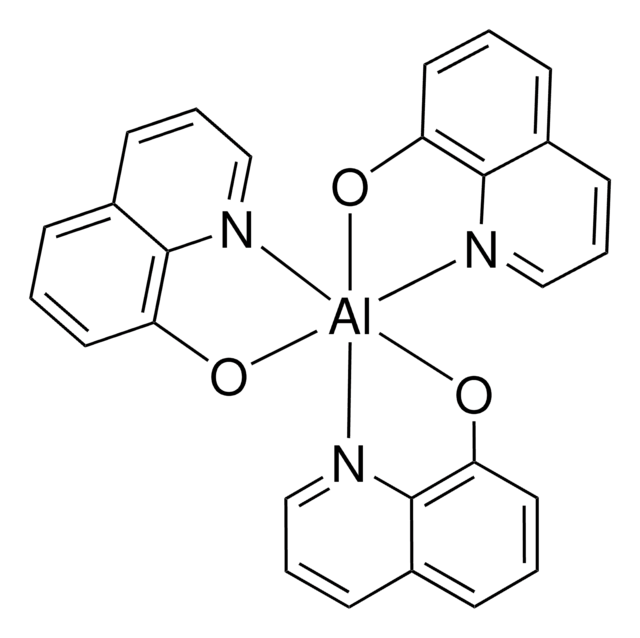701491
Silicon dioxide, alumina doped
nanoparticles, dispersion, <50 nm particle size, 20 wt. % in H2O, ≥99.9% trace metals basis
Synonyme(s) :
silicic anhydride, alumina doped preparation
About This Item
Produits recommandés
Niveau de qualité
Essai
≥99.9% trace metals basis
Forme
dispersion
nanoparticles
Composition
aluminum, 7.5 wt. %
Concentration
20 wt. % in H2O
Superficie
75.5 m2/g , BET
Taille des particules
<50 nm
pH
4-6(neat)
Densité
1.087 g/mL at 25 °C
Chaîne SMILES
O=[Si]=O.O=[Al]O[Al]=O
InChI
1S/2Al.O2Si.3O/c;;1-3-2;;;
Clé InChI
HNPSIPDUKPIQMN-UHFFFAOYSA-N
Vous recherchez des produits similaires ? Visite Guide de comparaison des produits
Catégories apparentées
Description générale
Informations légales
Code de la classe de stockage
12 - Non Combustible Liquids
Classe de danger pour l'eau (WGK)
WGK 1
Point d'éclair (°F)
Not applicable
Point d'éclair (°C)
Not applicable
Équipement de protection individuelle
Eyeshields, Gloves, type ABEK (EN14387) respirator filter
Faites votre choix parmi les versions les plus récentes :
Déjà en possession de ce produit ?
Retrouvez la documentation relative aux produits que vous avez récemment achetés dans la Bibliothèque de documents.
Les clients ont également consulté
Articles
Recent demand for electric and hybrid vehicles, coupled with a reduction in prices, has caused lithium-ion batteries (LIBs) to become an increasingly popular form of rechargeable battery technology.
Hydrogen is one of the most important resources in providing food, fuel, and chemical products for our everyday life. Sustainable catalytic hydrogen production from bioethanol has gained significant attention in recent years due to globally diminishing fossil fuel supplies, which have necessitated the search for new chemical feedstocks.
Silica is a very popular inorganic nanomaterial used in a wide range of applications including fillers for rubber, catalyst supports, separation media, carriers in food and agriculture, and abrasive/anticaking agents in cosmetics. It is also widely believed to be an important material for biomedical applications for following reasons.
White solid-state light can be generated using three different approaches: By employing three diodes that emit red, green and blue light respectively, by using a near-UV LED that excites several phosphors that emit over the complete spectral range, or the third, most widely used alternative entailing down-conversion of a portion of blue LED light to longer wavelengths in such a manner that white light emerges.
Notre équipe de scientifiques dispose d'une expérience dans tous les secteurs de la recherche, notamment en sciences de la vie, science des matériaux, synthèse chimique, chromatographie, analyse et dans de nombreux autres domaines..
Contacter notre Service technique






